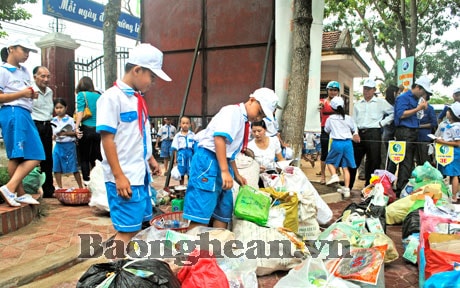Open signal from "Eco Savings"
(Baonghean)Recently in Bangkok (Thailand), the Final Conference took place to evaluate the implementation results of the Delgosea Project in 5 countries: Thailand, Indonesia, Philippines, Cambodia and Vietnam. Vinh City was honored to represent 4 cities of Vietnam (Da Nang, Lang Son, Tra Vinh, Vinh City) to participate in the conference for the second time.
The Delgosea project, co-funded by the EU and the Konrad Adenauer Stiftung Foundation (Germany), has been implemented in 104 schools in the Philippines and 150 schools in Thailand and Cambodia.
In Vietnam, the Delgosea Project has implemented the "Transfer and application of good practices in Southeast Asia" for 3 cities, namely the Eco-Saving Program of Marikina City (Philippines) applied to Vinh City; the "Preservation and Development of the Old Quarter" model of Phuket City (Thailand) applied to Da Nang City and the e-Government model of Yogjakarta City (Indonesia) applied to Tra Vinh City.

"Eco-saving" program at Hung Dung I Primary School - Vinh City.
Photo: Huu Quan
With the support of the Delgosea project and the Association of Vietnamese Cities, in September 2011, Vinh City decided to select 3 secondary and primary schools in Hung Dung ward to pilot the "Eco-saving" program in 2011 - 2012. After nearly 1 year of implementation, the program has attracted many participants, from students, teachers to parents and the community. With 38 "eco-days" taking place at all 3 schools in Vinh City in the 2011 - 2012 school year (from September 2011 to May 2012). The total amount of money that students accumulated from recycling waste was more than 80 million VND. Compared to the initial goal, this result has not met the requirements, but the indirect benefits that the Program brings are very meaningful. Through the program, students are educated in life skills, forming habits, awareness of waste management, rational use and protection of resources and the environment; clearly understanding the benefits that waste can bring. It is easy to see that students in Hung Dung ward have limited the situation of littering paper in the school yard during recess, and have begun to know how to classify and collect recyclable waste to participate in the Program.
The community in the pilot areas in Vinh City has also gradually adapted, thinking, acting and doing positively towards waste, such as classifying waste at source... It can be said that the "Eco-saving" program is very meaningful in both theory and practice. When implemented synchronously and widely, it will contribute to reducing pressure on the city's landfill and will reduce investment costs for collection and treatment. That is also the goal in waste management of urban areas, especially developing urban areas like Vinh City.
The initial results have had positive impacts on the city's residential community from thinking and awareness, contributing to the goal of building a civilized and clean city. From the experience and practical application in Vinh City, in April 2012, Ha Tinh City also visited and studied and implemented in 11 schools. Evaluating the initial results achieved by Vinh City, the Delgosea Project awarded the city a Cup and a Certificate of Merit for effective implementation.
On July 13, 2012, the Provincial People's Committee issued a document directing the replication of this model throughout the province. Accordingly, in the 2012-2013 school year, the City People's Committee will deploy this program throughout the area, continuing to create favorable conditions for budget support to implement it more effectively in the following years. Specifically, the Program will be deployed in 51 schools, including 23 secondary schools and 28 primary schools with a total of nearly 33,000 students participating.
To continue promoting positive effects, in the coming time, authorities at all levels from the city to wards, communes, schools, teachers, people and communities need to have greater determination to implement the program; especially continuing to seek the help of the Delgosea Project and the Association of Vietnamese Cities in the work of transferring, urging, inspecting and supporting the good implementation of practical models.
The Government needs to have a mechanism for financial spending on the program such as environmental projects. In addition, provincial and city authorities need to strengthen the role of urban environmental companies in proactively participating in the Program and have mechanisms and policies to support recycling waste collection facilities in the area, so that they have the conditions to expand their business areas, comply with regulations on environmental protection and the Law on Enterprises. On the part of wards and communes, it is necessary to institutionalize the participation of the community, socio-political organizations, and enterprises so that the "Eco-saving" Program can truly contribute positively and importantly to the process of solving "problems" of waste and the environment in the current period.






